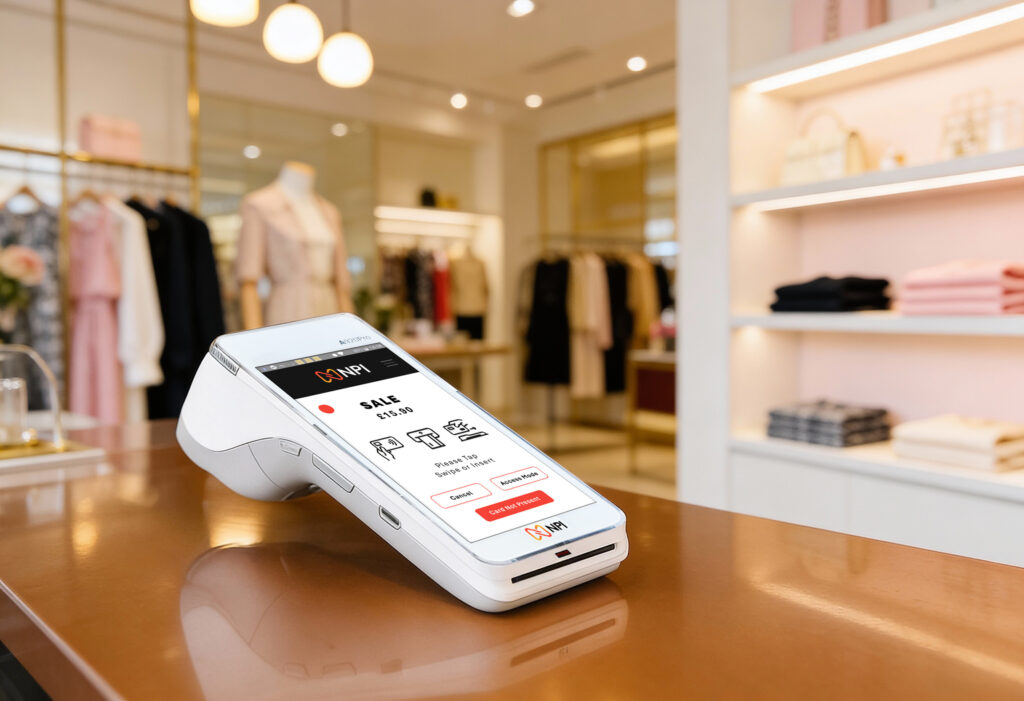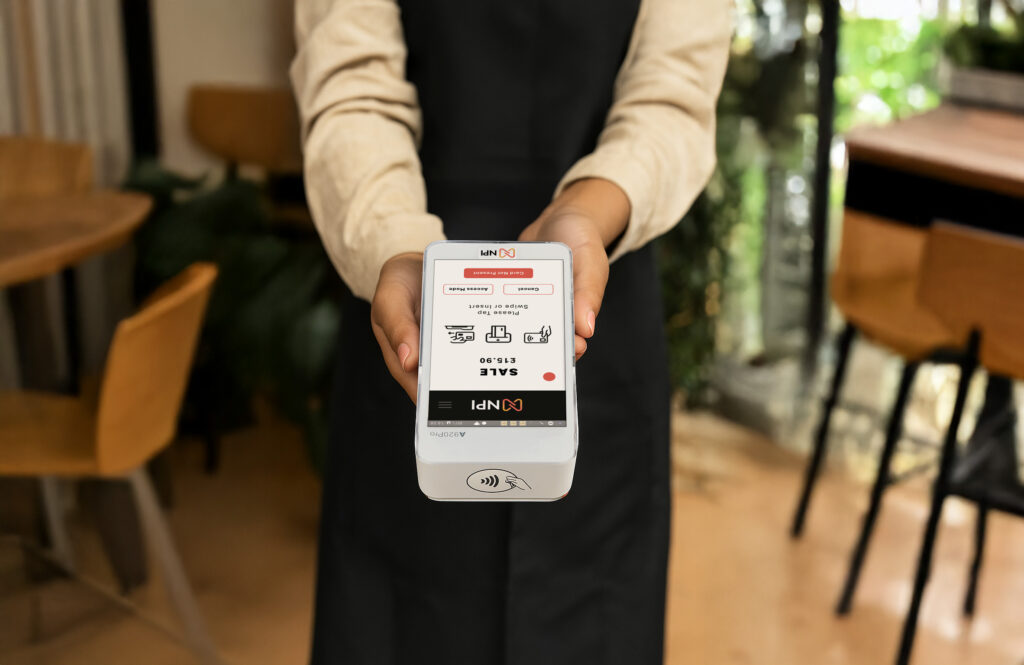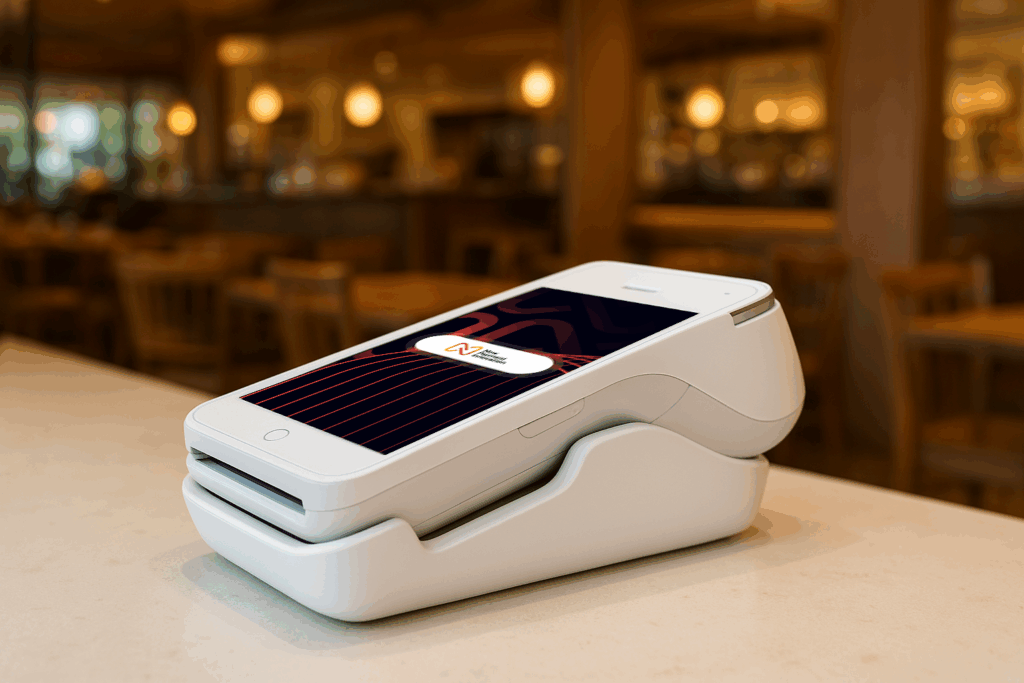An EPOS system is the modern-day comparison of what you may recognise as a ’till’ or ‘cash register’, driven by a completely digital platform instead of a mechanical one. For UK small businesses in 2025, EPOS systems represent far more than just a payment processing solution—they’re comprehensive business management platforms that can transform operations, improve customer service, and drive sustainable growth.
Electronic Point of Sale systems bring many business tasks together into one central platform, helping you work more efficiently. From inventory management and staff scheduling to customer relationship management and detailed analytics, modern EPOS systems offer small businesses the tools traditionally reserved for large enterprises.
This comprehensive guide explores everything UK small business owners need to know about EPOS systems, from understanding core functionality to selecting the perfect solution for your specific industry and requirements.
What is an EPOS System?
EPOS stands for Electronic Point of Sale and tends to be bought as a complete ‘system’ or ‘solution’ made up of 3 components: hardware, software, and payment processing.
Hardware Components
The physical elements of an EPOS system typically include:
- Central touchscreen terminal
- Card payment machine
- Receipt printer
- Cash drawer
- Barcode scanner
- Customer display screen
- Kitchen display systems (for hospitality)
Software Platform
The software drives the functionality of the system, such as recording sales, updating stock count, and tracking employee performance. Modern EPOS software is typically cloud-based, allowing access from multiple devices and locations.
Payment Processing Integration
Payment processing is an agreement between you and a payment provider to accept card payments from customers and have funds sent to your account. The best EPOS systems integrate seamlessly with payment processing, eliminating double-entry and reducing errors.
Key Differences: EPOS vs Traditional POS vs Cash Registers
Understanding the evolution from cash registers to modern EPOS systems helps illustrate the value proposition for small businesses.
Traditional Cash Registers
Basic cash registers simply record sales and store cash. They offer minimal data capture and no integration capabilities, making business analysis and growth planning challenging.
Basic POS Systems
POS stands for Point of Sale, which refers to the system a business uses to process customer transactions. Basic POS systems add some digital functionality but may lack comprehensive business management features.
Modern EPOS Systems
Where a traditional till can only record a sale, an EPOS system collects a host of information to populate detailed reports that allow you to make informed business decisions on sales, stock management, staff performance, and customer behaviour.
Core Benefits of EPOS Systems for Small Businesses
- Streamlined Operations and Efficiency
EPOS systems speed up sales transactions, reducing queues and allowing you to capture customer data whilst maintaining high customer service. This operational efficiency translates directly into improved customer satisfaction and increased sales capacity during peak periods.
- Real-Time Inventory Management
EPOS systems natively keep an accurate tally of your stock in real-time, whether it’s being restocked or sold. This real-time visibility helps prevent stockouts, reduces overordering, and optimizes cash flow through better inventory management.
- Comprehensive Business Analytics
Modern EPOS systems provide detailed insights into:
- Sales performance by product, time, and staff member
- Customer purchasing patterns and preferences
- Peak trading hours and seasonal trends
- Profit margins and cost analysis
- Staff productivity and training needs
- Enhanced Customer Experience
The right EPOS system will ensure that pricing of products across all online and offline platforms is updated correctly and customer payments can be made as quickly as possible. This consistency and speed create a professional customer experience that encourages repeat business.
- Staff Management and Accountability
Each till can have a separate sales report, enabling you to identify any missing money and what till the money is missing from. EPOS systems also track individual staff performance, helping identify training needs and reward top performers.
- Integrated Marketing and Customer Loyalty
Many EPOS systems include built-in customer relationship management (CRM) tools and loyalty program functionality, enabling targeted marketing campaigns and customer retention strategies.
Industry-Specific EPOS Solutions
Specialised POS systems are tailored to your industry and often come with helpful features you wouldn’t get with generalised systems.
Retail EPOS Systems
Retail-specific EPOS systems typically include:
- Advanced inventory management with size/colour variants
- Supplier management and purchase order generation
- Multi-location stock transfers
- Customer layaway and special order management
- Seasonal pricing and promotion tools
- Integration with e-commerce platforms
Leading retail EPOS providers include Lightspeed Retail, Epos Now, and Square for Retail.
Hospitality and Restaurant EPOS Systems
Restaurant POS systems may include table management, menu customisation, kitchen display systems, split billing, and delivery management. Additional features often include:
- Table layout and reservation management
- Kitchen order routing and timing
- Split billing and tip management
- Menu engineering and cost analysis
- Integration with delivery platforms
- Staff scheduling and payroll integration
Popular hospitality solutions include Lightspeed Restaurant, Square for Restaurants, and TouchBistro.
Service-Based Business EPOS
Service businesses benefit from EPOS systems that offer:
- Appointment scheduling and calendar management
- Customer history and service records
- Recurring billing and subscription management
- Commission tracking for staff
- Service package and bundle management
Technical Considerations for EPOS Implementation
Cloud vs On-Premise Systems
Cloud hosting is ideal for multi-site businesses analysing data across several locations. Cloud-based EPOS systems offer:
- Automatic software updates and security patches
- Access from multiple devices and locations
- Automatic data backup and recovery
- Lower upfront hardware costs
- Scalability for growing businesses
On-premise systems may be preferred by businesses with specific security requirements or limited internet connectivity.
Integration Capabilities
Modern EPOS systems can sync with over 100 of the most popular business applications, offering the widest number of integrations available. Key integrations include:
- Accounting software (QuickBooks, Xero, Sage)
- E-commerce platforms (Shopify, WooCommerce, Magento)
- Customer relationship management (CRM) systems
- Marketing automation tools
- Supply chain management systems
- Payroll and HR software
Scalability and Growth Planning
Choosing an EPOS system that can grow with your business is crucial for ensuring long-term viability and efficiency. Consider systems that support:
- Additional till points and user accounts
- Multi-location management
- Advanced reporting and analytics
- Third-party app marketplace
- API access for custom integrations
Cost Analysis: Investment vs Returns
Initial Hardware Investment
A full integrated EPOS system with a till, display, cash drawer, and necessary software may be as cheap as £700. However, costs can vary significantly based on requirements:
- Basic tablet-based systems: £200-500
- Mid-range integrated systems: £700-1,500
- Advanced multi-terminal setups: £2,000-5,000+
Ongoing Software and Service Costs
EPOS for small businesses may be rented for as cheap as £20 per month. Monthly costs typically include:
- Software licensing: £20-100+ per month
- Payment processing fees: 1.5-3% per transaction
- Support and maintenance: Often included in monthly fees
- Additional integrations: £10-50 per month per app
Return on Investment (ROI)
EPOS systems are very effective in increasing the profitability of businesses through:
- Reduced transaction times and increased customer throughput
- Improved inventory management reducing waste and stockouts
- Better staff productivity and reduced labour costs
- Enhanced customer insights driving targeted marketing
- Reduced shrinkage and improved security
Selecting the Right EPOS Provider
Key Evaluation Criteria
Quality support services can significantly impact day-to-day operations, helping minimise downtime and resolve issues quickly. When evaluating EPOS providers, consider:
- Industry Expertise Choose providers with specific experience in your industry sector who understand your unique challenges and requirements.
- Support and Training When you receive your EPOS system, you will be assigned a dedicated EPOS account manager for your first 30 days, delivering 5 training sessions covering product setup, reporting, customer data capture, stock management, and staff management.
- System Reliability and Uptime Look for providers offering robust infrastructure with minimal downtime and reliable customer support when issues arise.
- Customisation and Flexibility EPOS Direct’s solution includes a simple till interface that makes it easier for employees to find products and allows them to learn how to use the till in minutes.
- Data Security and Compliance Ensure your chosen provider meets all relevant data protection requirements including PCI DSS compliance for payment processing and GDPR compliance for customer data management.
Implementation Best Practices
Pre-Implementation Planning
Before implementing your EPOS system:
- Audit Current Processes: Document existing workflows, pain points, and improvement opportunities
- Define Success Metrics: Establish clear goals for efficiency gains, cost savings, and revenue improvements
- Staff Preparation: Communicate changes to staff and address concerns proactively
- Data Migration Planning: Plan how to transfer existing customer and inventory data
Successful Rollout Strategy
Easitill’s training programs are designed to enable users to fully take advantage of the system’s capabilities, with sessions tailored to each business.
- Start with core functionality before adding advanced features
- Provide comprehensive staff training with hands-on practice
- Run parallel systems briefly to ensure smooth transition
- Monitor performance closely during initial weeks
- Gather feedback and adjust configurations as needed
Ongoing Optimisation
It’s important to regularly review your data to make sure you’re capitalising on any trends. Maximise your EPOS investment through:
- Regular review of sales and performance reports
- Continuous staff training on new features
- Integration with additional business applications
- Regular system updates and security patches
- Performance monitoring and optimisation
Common Implementation Challenges and Solutions
Staff Resistance to Change
Address resistance through:
- Clear communication about benefits
- Comprehensive training programs
- Gradual rollout with support
- Recognition of early adopters
Data Integration Issues
Minimise integration problems by:
- Working with experienced implementation partners
- Testing data migration thoroughly
- Maintaining backup systems during transition
- Having rollback plans if needed
Budget Overruns
Control costs through:
- Detailed upfront cost analysis
- Phased implementation approach
- Clear scope definition
- Regular budget monitoring
Future Trends in EPOS Technology
Artificial Intelligence and Machine Learning
AI-powered EPOS systems are beginning to offer:
- Predictive inventory management
- Personalised customer recommendations
- Dynamic pricing optimization
- Fraud detection and prevention
Mobile and Contactless Integration
Contactless card payments remain dominant, with the average UK consumer tapping their cards over 20 times a month. Future EPOS systems will further embrace:
- Mobile payment processing
- QR code ordering and payment
- Voice-activated transactions
- Augmented reality product information
Enhanced Analytics and Business Intelligence
Advanced EPOS systems are incorporating:
- Real-time dashboard analytics
- Predictive business insights
- Automated reporting and alerts
- Integration with business intelligence platforms
Conclusion
EPOS systems have many advantages for small businesses and won’t just help manage daily sales and stock, but can also help businesses grow. For UK small businesses in 2025, implementing the right EPOS system represents a strategic investment that can transform operations, improve customer experience, and drive sustainable growth.
The key to success lies in choosing a system that aligns with your specific industry requirements, growth plans, and budget constraints. By choosing the right system that can grow with your business, you’re investing in a solution that will support your operations now and in the future.
Whether you’re running a retail shop, restaurant, or service business, modern EPOS systems offer the tools and insights needed to compete effectively in today’s market. The investment in a quality EPOS system pays dividends through improved efficiency, better customer service, and data-driven decision making.
Ready to transform your business with a modern EPOS system? Contact our UK specialists today for a personalized consultation and demonstration tailored to your specific business needs.







